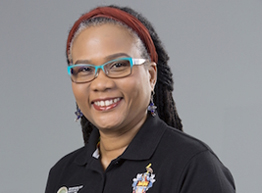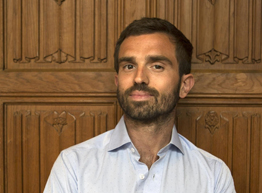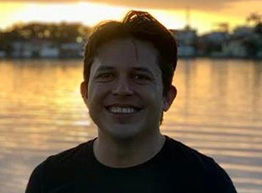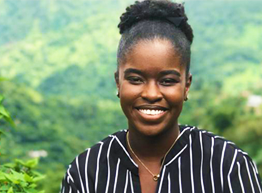Menu
Close
Introduction:
Caribbean futures are being forged in the crucible of globalization and climate change. Yet with the intensification of the climate crisis the region is being exposed to a rapid surge in development projects and foreign investments that are sacrificing local community rights and are environmentally destructive. This phenomena has been described as ‘disaster capitalism’ a term popularized by Naomi Klein (2007), Canadian writer, journalist and activist. She has argued that “every time a new crisis hits –– the fear and disorientation that follow are harnessed for radical social and economic engineering” (49). However, for Caribbean spaces to be sustainable then models of accumulation that thrive on crises and the racial legacies of structural violence from colonialism must be resisted, and the high modernist visions of development that multiply and create disaster risks in the name of progress must be debunked. In their stead, greater effort must rest on placing people’s voices at the centre of approaches to development, climate change adaptation and mitigation in the Region. In this overview, I will examine the character of ‘disaster capitalism’ and speak to a new project, funded by the Open Society Foundations, on Disaster Capitalism in the Caribbean Region that is seeking to mobilize and support communities at risk, to advance climate justice and alternative models of change that can enhance both regional food and decolonial futures.
Background
Latin America and the Caribbean are considered the second most disaster-prone region in the world with 152 million persons affected by 1205 disasters between 2000 and 2019 (OCHA, 2020). The region is exposed to a range of hydro-meteorological hazards namely, hurricanes, floods, and drought as well as geological hazards such as earthquakes, tsunamis, volcanoes, and landslides.
According to the World Bank, The impacts of these hazards have resulted in an average loss of almost US$1.6 billion per year between 1998 and 2018 (World Bank, 2018). In some countries, the extent of the damage exceeds the size of the economy, for e.g., where Hurricane Maria cost Dominica 225% of its GDP (World Bank, 2018). The impact of the disasters is of growing concern as the region experiences more frequent extreme events, occurring concurrently, or in rapid succession, in different states in the context of climate change.
However, while Small Island Developing States, (SIDS), and the Caribbean region are exposed to multiple hazards, historical, social, cultural, economic, institutional, and political forces result in differential impacts and losses across the region (Lopez-Marrero & Wisner, 2012). For example, Haiti had the largest number of deaths (8,608 deaths) caused by natural hazards between 1980 and 2009 as a result of floods and landslides from meteorological systems (Rhiney, 2015). However, Cuba, a country with the second-highest number of disaster events over the same period has an estimated death toll of 193 to 203 (Rhiney, 2015). A similar contrast could be drawn between Haiti and the rest of the Caribbean as well in relation to the divergent experiences of hunger and food insecurity. These differences in socio-political vulnerability across the region are thus the principal determinants of susceptibility to both the long violence of racial histories, as well as to the sudden disasters, which elicit in their wake ‘disaster capitalism.’
Disaster capitalism has been conceptualized as the utilization of catastrophic events as a window of opportunity for political reforms and/ or for economic profiteering (Klein, 2008; Sandoval, et al., 2022). Thus disaster capitalism is the process by which government and private sectors benefit from disasters either economically or politically at all scales (Sandoval, et al., 2022). This includes benefitting from the displacement or disempowerment of the affected population, the centralization of decision-making power post-emergency, the long-term dependence on international aid, and the relaxation or the repeal of socioeconomic regulations and legislation (Edwards Jr., 2016). These circumstances of vulnerability allow for the leveraging of policies that favor liberalization, deregulation, and transnational interests (Edwards Jr., 2016). In this context, as Sandoval et al 2022 have stated, (in their global case studies of disaster capitalism that look at the role of private and public sectors), “when the decision-making space is occupied by self-interested actors, it poses a challenge to all disaster risk reduction (DRR) and resilience efforts made by citizens, communities, national and local governments, and international organisations ” (3).
The exposure to disaster capitalism is magnified in the context of Caribbean histories under globalization and the legacy of the plantation economy which has tilted most Caribbean economies towards tourism, agriculture or natural resource extraction industries, (Collymore, 2011). Thus, while the state of a country’s vulnerability to natural hazards is a multi-factoral problem, given the geographical location, environmental and economic characteristics of the Caribbean region, these physical states of vulnerability may be compounded, rather than reduced, by the forms of global and local development projects that are taking place. Disasters are therefore largely socially and politically constructed.
Disaster capitalism may thus be more broadly defined as the exploitation of ‘non-natural disasters’ that are tied to hurricanes, wars, economic crises or pandemics, as well as to longer term economic and socio-political vulnerabilities. With the latter state of vulnerability being deeply implicated in both neoliberal development policies and colonial philosophies of primitive accumulation based on a racial logic of extraction. As such, this multi-temporal phenomena of disaster capitalism is not inevitable but rather depends on the policies and practices of enabling State elites and a global political environment shaped by a racial and colonial capitalism. And, as highlighted by the contrastive examples of Haiti and Cuba, our regional histories of structural violence and capitalist development have always placed racialized populations at an acute disadvantage. Given this perspective, our project supports the argument by disaster risk scholars, Ben Wisner & Allan Lavell, that one needs a critical shift from discourses of disaster risk reduction and resilience in order to embrace a new paradigm of ‘Resisting Disaster Risk Creation’ RDRC, (Wisner & Lavell, 2017).
This imposition of Disaster capitalism in the Caribbean has been met with resolute resistance, with local grass root organizations raising their voices against injustices, loss of access to resources, and the increased marginalization of residents. Recent examples of indigenous and grass root actors mobilizing for justice against the historical and contemporary time lines of disaster capitalism In the Caribbean, include the Maya people of Toledo District, who organized against the Government of Belize and received a successful judgement from the Caribbean Court of Justice in 2015 on their rights to their communally owned lands (Gahman, Penados, & Greenidge, 2019). Similarly, the Grenada Land Actors received a favourable but contested judgment last year in the Eastern Caribbean Supreme Court of Appeal against the Government of Grenada and private developers supporting their right to access environment justice with respect to the impact of development on the environment (Grenada Land Actors, 2023, https://grenadaland.org/newsroom/court-of-appeal-rules-in-favor-of-the-grenada-land-actors ). In addition, the people of Barbuda are also actively challenging the Government of Antigua and Barbuda through the UK Privy Council, given that recent development projects implemented in Barbuda within the Post Hurricane context of Irma and Maria in September 2017, rest on the negation of their centuries old communal land tenure system that had been subsequently codified into law. Also, impacted by the Category 5 Hurricanes Irma and Maria in the same year, the people of Puerto Rico continue to resist the wave of dispossession taking place as the battered island becomes earmarked as a haven for investors to capitalize on lax tax laws and struggling real estate markets, and as it becomes neoliberally re-engineered by the government’s continuing attempts at privatizing the education and energy sectors (Rhiney, 2020). Yet, as Bonilla (2020) has emphasized in exploring the ‘coloniality of disaster’ in Puerto Rico, their “debt crisis … paved the way for infrastructural vulnerability and social abandonment long before hurricane María ”(6). The dangers of a disordering reconstruction by state and non-state actors, are also being confronted by the Raizal peoples in Colombia, in the context of hurricane Iota which reached the San Andrés archipelago (San Andres, Providencia and Santa Catalina) on 16 November 2020. As they continue to fight for the protection of their indigenous heritage, including their right to food and environment. The several examples highlighted above, all point to the need for regional solidarity to bring greater awareness to the nature of these complex disasters and socio-politically constructed risks impacting the region.
In this context of political, environmental and social precarity as well as resistance, the project Disaster Capitalism in the Caribbean Region: Networking, Sharing and Learning from Community Responses, supported by a 2022 grant from the Open Society Foundations aims to share the stories and experiences of regional grass root organizations’ experiences with disaster capitalism at varying scales. The project builds on previous work from the 2020 UK Global Challenges Research Funded, (GCRF) Food Insecurity at the Time of Climate Change project that was led by the Bristol University, with Principal Investigator Dr Jessica Paddock. The GCRF project unified four academic /university partners and 5 grassroots civil society organizations across five Caribbean countries, namely Barbuda, Belize, Colombia, Jamaica and Puerto Rico, to share experiences on food insecurity and climate change. This fostered the creation of a regional community and website, Stronger Caribbean Together, to strengthen grassroots organizations’ efforts to address food insecurity and climate issues (https://strongercaribbeantogether.org/). The previous project which ended March 2022, also enabled grassroots organizations to identify connections between their problems and provide pathways towards solutions.
Overall, our current project, proposes dialogue and knowledge exchange between non-state actors to empower and equip organizations to challenge local disaster capitalism projects and policies. The international exchange of ideas from multiple partners across the region to share experiences not only unifies the region but also allows locals in the region to identify political patterns that are often construed as exceptions (Bethell-Bennett & Furst, 2021). With this project we seek to expand the current network of partners to twenty grassroots organizations across the region and fill 3 gaps, namely: 1. The lack transnational network; 2. The lack of digital space for knowledge and information sharing and 3. The limited access to legal advocacy and support.
The project will thus share the stories and experiences of our project partners and make them easily accessible online for additional support. And, it will provide them with access to international actors operating around legal advocacy and legal support, namely through the Global Legal Actors Network (GLAN), the Climate Litigation Accelerator (CLX) and Freedom Imaginaries (FI). Through these means we wish to help amplify the voices of the project partners and build bridges to additional support for their struggles.
To date the following 11 groups have become members of the network.
Agroprovidencia , COLOMBIA
Agroprovidencia is an association that promotes indigenous rights through food security and food sovereignty in Providencia and Santa Catalina,
Bernard Lodge Farmers Group, JAMAICA
The Bernard Lodge Farmers Group focuses on advocating for the rights and needs of the farmers that occupied the Bernard Lodge Lands and have been recently displaced.
Grenada Land Actors, GRENADA
The GLA is an independent network of professionals, non-governmental Organizations (NGOs), community-based organizations (CBOs), private land users, and activists that are promoting equitable, inclusive, and sustainable development of Grenada’s land resources
Julian Cho Society , BELIZE
The Julian Cho Society is a non-profit, non-governmental membership organization dedicated to the conservation of the environment and indigenous lands of southern Belize.
WAVE- an associate of the Progressive Reform Movement – DOMINICA
Waitukubuli Advocates for Viable Environments- WAVE -is an organization in Dominica that aims to identify, document and publicize environmental damage and destruction across the nation through various outlets.
Raizal Youth Organization- COLOMBIA
The Raizal Youth Organization is an ethnic-based organization that struggles for the rights and self-determination of the Raizal people in the Archipelago of San Andrés in Colombia.
Save Barbuda- BARBUDA
Save Barbuda is a group of local and foreign advocates for socio-environmental justice in Barbuda, opposing developments which cause irreversible negative impacts and are incompatible with the rights of people and the environment
The Karl Lévêque Cultural Institute (ICKL)- HAITI
ICKL is a non-religious, non-profit, private foundation with no political affiliations that promotes the sharing of the experiences of struggles and organisations underway in Haiti.
Tèt Kole Ti Peyizan Ayisyen – HAITI
Tèt Kole, which means solidarity in Haitian Creole, is a National Peasant, or small farmers Organization, and since 2007 supports a concrete project in Haiti, which meets the needs of children faced with the problems posed by the succession of natural disasters.
Fideicomiso de la Tierra del Caño Martín Peña- PUERTO RICO
The Caño Martín Peña Community Land Trust is the instrument used by the residents of seven communities adjacent to the Caño Martín Peña, initially informal settlements, to control and lead the development of nearly two hundred (200) acres of land located in San Juan, Puerto Rico without putting its residents at risk of displacement.
La Colmena Cimarrona in Vieques- PUERTO RICO)
La Colmena Cimarrona practices solidarity economy, agroecology, and beekeeping with the intention of flourishing food sovereignty in the Puerto Rican archipelago.
Network building Methodology
Three methods are being used to identify partners, namely snowballing, on line key word searches and the use of Ramsar protected areas and environmental justice map searches. Snowballing is a technique in which additional partners were recommended by referral from project partners. Snowballing techniques were used to identify partners in Haiti, Grenada and Dominica. In addition to snowballing, an online keyword search on environmental activism, land rights and food sovereignty was done, with each of these concepts nested within the overarching theme of disaster capitalism. This was then used to help identify additional partners. In an attempt to ensure that the additional partners flagged are reflective of different regions across the Caribbean, a list of each Caribbean country was placed into an Excel sheet organized by the location and governance structure of each country. Once organizations were identified online, they were subsequently investigated to ensure that the organizations are still active. Finally, complementing the online key word searches, the Global Atlas of Environmental Justice, and the Ramsar websites were used to locate environmental hotspots, protected environmental areas and local resistance to displacement or the loss of rights to land and the environment which may have been triggered by the conjuncture of climate change and disaster capitalism.
Ultimately, through this project, we are building and supporting a regional community of resistance to disaster capitalism and disaster risk creation by embracing the right to say no, in order to sustain our rights to life, dignity, food and the environment.
Backstrand, K., Kuyper, J. W., Linner, B.-O., & Lovbrand, E. (2017). Non-state actors in global climate governance: from Copenhagen to Paris and beyond. Environmental Politics, 26(4), 561-579.
Bethell-Bennett, I. A., & Furst, S. M. (2021). Moving Forward Post-Hurricane Dorian: The Necessity for Public, Private, and Individual Collaboration in the Face of Climate Change. International Journal of Bahamian Studies, 27, 87-92.
Bonilla, Y. (2020). The coloniality of disaster: Race, empire, and the temporal logics of emergency in Puerto Rico, USA. Political Geography, 78(102181).
Climate Studies Group Mona. (2020). The State of the Caribbean Climate. Caribbean Development Bank.
Collymore, J. (2011). Disaster management in the Caribbean: Perspectives on institutional capacity reform and development. Environmental Hazards, 10(1), 6-22.
Cutter, S. L., Boruff, B. J., & Shirley, W. L. (2003). Social Vulnerability to Environmental Hazards. Social Science Quarterly, 84(2), 242-261.
Edwards Jr., R. F. (2016). Disaster Capitalism: Empirical Evidence from Latin America and the Caribbean. Florida International University.
Gahman, L., Penados, F., & Greenidge, A. (2019). Indigenous resurgence, decolonial praxis, alternative futures: the Maya Leaders Alliance of Southern Belize. Social Movement, 19(2), 241-248.
Gould, K. A., & Lewis, T. L. (2018). Green Gentrification and Disaster Capitalism in Barbuda. NACLA Report on the Americas, 50(2), 148-153. https://doi.org/10.1080/10714839.2018.1479466
Government of Antigua and Barbuda. (2017). Hurricane Irma Recovery Needs Assessment: A Report by the Government of Antigua and Barbuda. World Bank, GFDRR, UN, and EU.
Grenada Land Actors. (2023). Court of Appeal Rules in Favor of the Grenada Land Actors. Retrieved from https://grenadaland.org/newsroom/court-of-appeal-rules-in-favor-of-the-grenada-land-actors
Holdschlag, A., & Ratter, B. M. (2016). Caribbean island states in a social-ecological panarchy? Complexity theory, adaptability and environmental knowledge systems. Anthropocene, 13, 80-93.
Klein, N. (2007). The Shock Doctrine: The Rise of Disaster Capitalism . Harlow, England: Penguin Books.
Kronik, J., & Verner, D. (2010). Indigenous peoples and climate change in Latin America and the Caribbean. World Bank Publications.
Lopez-Marrero, T., & Wisner, B. (2012). Not in the same boat: disasters and differential vulnerability in the insular Caribbean. Caribbean Studies, 40(2), 129-168.
OCHA. (2020). Natural Disasters in Latin America and the Caribbean.
Rhiney, K. (2015). Geographies of Caribbean Vulnerability in a Changing Climate: Issues and Trends. Geography Compass, 9(3), 97-114.
Rhiney, K. (2020). Dispossession, disaster capitalism and the post-hurricane context in the Caribbean. Political Geography, 78(102171). https://doi.org/10.1016/j.polgeo.2020.102171
Sandoval, V., Forino, G., von Meding, J., Gonzelez-Muzzio, C., Chmutina, K., Paez, H., Boyland, M. (2022). The role of public and private sectors in disaster capitalism: an international overview. United Nations Office for Disaster Risk Reduction. https://morocco.un.org/sites/default/files/remote-resources/49f1555ef750eb856c133e907c6cc0fa.pdf
Schuller, M., & Maldonado, J. K. (2016). Disaster capitalism. Annals of Anthropological Practice, 40(1), 61–72. https://doi.org/10.1111/napa.12088
World Bank. (2018). Disaster Risk Management in the Caribbean: The World Bank’s Approaches and Instruments for Recovery and Resilience.

Principal Investigator Senior Fellow Sir Arthur Lewis Institute of Social and Economic Studies (SALISES) The University of the West Indies, (UWI) Mona

Co-Investigator Research professor at the Faculty of Law and Institute of Development Policy at the University of Antwerp

Senior Research Assistant PHD in Composition and Cultural Rehtoric, Syracuse University

Research Assistant Doctoral Student, University of The West Indies

Showcasing stories of Caribbean organizations at the foreground of the struggle against disaster capitalism in the Caribbean. Our network of participants in the Greater Caribbean region connect, learn, share their hands on responses to the impacts of the twin threats of the climate crisis and disaster capitalism in our region.
WAVE (Progressive Reform Movement)
Global Challenges Research Fund
Open Society Foundations
All Rights Reserved – strongercaribbeantogether.org 2022
All Rights Reserved – strongercaribbeantogether.org 2022
In the tumultuous aftermath of disasters, it is easy to feel isolated and alone, but you are not.
We, a network of Caribbean-wide community organizers who stand in solidarity with those affected the twin threats of the climate crises and disaster capitalism, a phenomenon that exacerbates the suffering of vulnerable communities.
We want you to know that your stories matter. We are here to listen, to support, and to amplify your voices.
We believe that together, we can challenge the forces of disaster capitalism and advocate for more sustainable, inclusive and equitable decision-making.
Join us in solidarity. Share your experiences and let’s build strong communities that thrive together.
As the wider world braces for the climate change, Caribbean communities are already struggling with its effects. Small local communities, small scale farmers and coastal communities are disproportionately affected. Political decisions, power dynamics and laws often compound the catastrophes and silence bottom up solutions.
There are ways in which you can help.